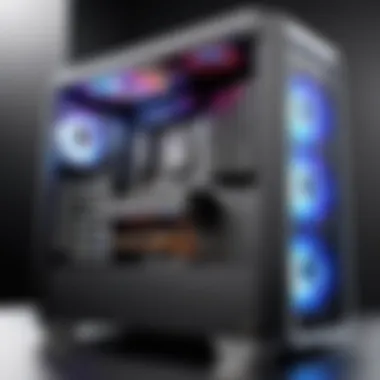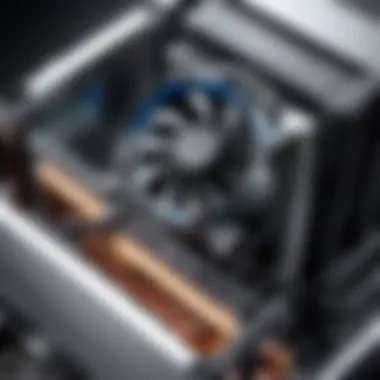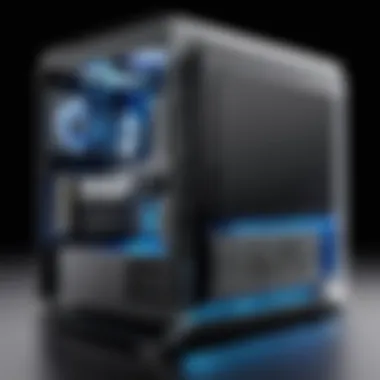Unveiling the Intricacies of Gaming PC Whole Sets: A Comprehensive Guide


Esports Coverage
Esports coverage in the realm of gaming PC whole sets dives deep into the world of pro-gaming tournaments, shedding light on the intense competition among skilled players. Player profiles and interviews provide a glimpse into the lives and strategies of top gamers, offering valuable insights into their techniques and mindset. Moreover, team strategies and analysis dissect the collaborative efforts and tactical approaches utilized by competitive gaming teams to achieve victory.
Hardware Testing
When it comes to hardware testing in the context of gaming PC whole sets, reviews of gaming monitors play a crucial role in evaluating display quality, refresh rates, and color accuracy, essential for an immersive gaming experience. Performance analysis of GPUs delves into the processing power, efficiency, and thermal management of graphics cards, key components in rendering stunning visuals in modern games. Additionally, a comparison of mechanical keyboards scrutinizes factors such as key switches, actuation force, and durability, highlighting the significance of a responsive and reliable input device.
Game Reviews
Introduction to Gaming PC Whole Set
In this section, we will embark on a comprehensive exploration of the vital components that make up a gaming PC whole set. Understanding the intricacies of these elements is crucial for optimizing gaming performance and experiencing the full potential of modern games. Whether you are a seasoned gamer or a newcomer to the world of PC gaming, grasping the nuances of gaming PC components is essential for making informed decisions when building or purchasing a gaming rig.
Understanding the Importance of Gaming PC Components
The Role of CPU
The central processing unit (CPU) stands as one of the most critical components in a gaming PC setup. Acting as the brain of the computer, the CPU handles various calculations and operations required for smooth gaming performance. Choosing the right CPU can significantly impact your gaming experience, determining factors such as framerate, game loading times, and overall system responsiveness. Whether opting for AMD or Intel processors, understanding the role of the CPU is paramount in crafting a high-performance gaming rig.
Impact of GPU on Gaming Performance
The graphics processing unit (GPU) plays a pivotal role in shaping gaming performance, particularly when it comes to rendering complex visuals and enhancing game graphics. Selecting a GPU with ample processing power and memory is crucial for running modern games at optimal settings and resolutions. Evaluating the impact of the GPU on gaming performance involves considering factors like shader cores, clock speeds, and VRAM capacity to ensure a seamless and visually captivating gaming experience.
Significance of RAM Capacity
Random access memory (RAM) capacity directly influences the multitasking capabilities and overall performance of a gaming PC. Adequate RAM ensures smooth gameplay by allowing the system to store and access data quickly during gaming sessions. Determining the right RAM capacity for your gaming needs involves considering factors like game requirements, multitasking habits, and future-proofing your system for upcoming game releases. Optimizing RAM capacity is essential for achieving optimal gaming performance and avoiding potential bottlenecks in system responsiveness and loading times.
Memory and Storage Solutions


In the realm of gaming PC setups, memory and storage solutions play a critical role in determining overall performance. Understanding the intricacies of RAM capacity and storage types is fundamental in optimizing your gaming experience. When it comes to RAM, selecting between DDR3 and DDR4 RAM involves considering factors like speed, efficiency, and compatibility. DDR3 RAM is a reliable choice known for its affordability and stability. In contrast, DDR4 RAM offers faster speeds, improved power efficiency, and better future-proofing. Assess your budget and performance requirements to make an informed decision between DDR3 and DDR4 RAM.
RAM and Its Impact on Gaming Performance
DDR3 vs. DDR4 RAM
Comparing DDR3 and DDR4 RAM reveals distinct advantages and limitations. DDR3, with its established technology, presents a cost-effective option suitable for budget-conscious gamers. On the other hand, DDR4, known for its higher data transfer rates and lower power consumption, caters to users seeking enhanced performance and efficiency. The choice between DDR3 and DDR4 RAM hinges on your preference for affordability versus cutting-edge performance.
RAM Capacity for Different Gaming Needs
Tailoring RAM capacity to different gaming needs is crucial for seamless gameplay. Whether you're engaging in intense multitasking or running memory-intensive applications, having adequate RAM ensures smooth operability. Choosing the right RAM capacity depends on your usage patterns and system requirements. Gamers with demanding workloads benefit from higher RAM capacities, whereas casual users might find standard capacities sufficient for their gaming endeavors.
Effects of RAM Speed on Gaming
The speed of RAM directly influences gaming performance by affecting data transfer rates and response times. Opting for higher RAM speeds translates to quicker loading times, smoother gameplay, and reduced latency. Balancing RAM speed with other components like the CPU and GPU is essential to maintain system harmony. While faster RAM speeds enhance gaming performance, they may come at a higher cost. Consider your budget and desired gaming experience to determine the optimal RAM speed for your setup.
Choosing the Right Storage for Gaming PC
When it comes to storage solutions for your gaming PC, the debate between SSDs and HDDs continues to sway consumers. SSDs excel in terms of speed, delivering rapid boot times and data access. In contrast, HDDs offer greater storage capacities at more affordable prices. Making a choice between SSDs and HDDs entails evaluating your priorities in terms of speed, capacity, and budget.
SSD vs. HDD for Gaming
Comparing SSDs and HDDs uncovers differences in performance and storage capabilities. SSDs excel in speed, providing quick access to files and faster loading times for games. On the other hand, HDDs offer expansive storage options at lower costs. Balancing speed and capacity considerations is key in deciding between SSDs and HDDs for your gaming setup.
Storage Capacity Considerations
Assessing storage capacity aligns with your gaming habits and storage requirements. Consider factors like the size of game files, multimedia content, and long-term storage needs when selecting the appropriate capacity. Opting for sufficient storage capacity ensures seamless gaming experiences without concerns about storage limitations.
Benefits of NVMe SSDs in Gaming PCs


NVMe SSDs present a cutting-edge storage solution with significantly faster data transfer rates compared to traditional SSDs. The benefits of NVMe SSDs include reduced loading times, improved system responsiveness, and enhanced multitasking capabilities. Incorporating NVMe SSDs into gaming PCs elevates performance levels, making them ideal for gamers who prioritize speed and efficiency.
Cooling Systems and Maintenance
In the realm of gaming PC rigs, the critical aspect of Cooling Systems and Maintenance holds paramount importance. Efficient cooling is essential to maintain optimal performance and longevity of hardware components. A well-designed cooling system prevents overheating, ensuring stable operation even during intensive gaming sessions. Regular maintenance of cooling systems aids in dust removal, which can accumulate over time and hinder airflow, leading to increased temperatures and decreased efficiency.
Air vs. Liquid Cooling Systems
Efficiency and Noise Levels Comparison
When comparing Air and Liquid Cooling Systems, one key aspect to consider is the efficiency and noise levels. Air cooling systems are generally more cost-effective and straightforward, utilizing fans to dissipate heat efficiently. However, they can sometimes be noisier compared to liquid cooling solutions. On the other hand, liquid cooling systems offer superior cooling performance and quieter operation but come at a higher price point.
Liquid cooling systems have the advantage of efficiently transferring heat away from critical components, ensuring stable temperatures even under heavy loads. This feature appeals to users seeking silent operation without compromising on cooling efficiency. However, the complexity of liquid cooling setups may deter novice builders or those looking for a simpler solution.
Overclocking Considerations with Cooling Systems
When considering overclocking, the choice of cooling system plays a crucial role in maintaining system stability. Efficient cooling solutions help dissipate the additional heat generated from overclocked components, preventing thermal throttling and potential damage. Liquid cooling systems are preferred for overclocking due to their superior heat dissipation capabilities, enabling users to push their hardware to higher performance levels safely.
Maintenance Tips for Cooling Systems
Proper maintenance is key to prolonging the lifespan of cooling systems and ensuring optimal performance. Regular cleaning of fans, radiators, and filters is essential to prevent dust buildup, which can impede airflow and cause overheating. Additionally, monitoring coolant levels in liquid cooling systems, checking for leaks, and ensuring proper pump functionality are vital maintenance practices to uphold cooling efficiency and component longevity.
Importance of Proper Case Ventilation
Airflow Optimization Techniques
Optimizing case ventilation is crucial to maintaining a consistent airflow within the system, preventing hot spots and ensuring efficient heat dissipation. Strategically placing intake and exhaust fans, along with utilizing dust filters to maintain clean air circulation, contributes to improved airflow management. Proper cable management also aids in airflow optimization by reducing obstructions and improving overall system ventilation.
Dust Management Strategies


Effective dust management is essential for maintaining optimal cooling performance and component longevity. Implementing dust filters, scheduled cleaning routines, and ensuring positive air pressure inside the case can help minimize dust accumulation. Regular inspection of air ducts, fans, and heatsinks for dust buildup is recommended to prevent airflow restrictions and overheating issues.
Enhancing Cooling Performance with Case Fans
Integrating additional case fans can significantly enhance cooling performance by increasing airflow and reducing ambient temperatures inside the case. Supplemental fans can be strategically positioned to create airflow pathways that target specific components, such as the CPU, GPU, and VRMs. Investing in high-quality, quiet fans with adequate static pressure and airflow ratings ensures optimal cooling efficiency without generating excessive noise levels.
Building vs. Buying a Gaming PC
When delving into the intricate world of gaming PC whole sets, one crucial decision looms large for enthusiasts: should they build their gaming rig from scratch or opt for the convenience of purchasing a pre-built system? This section aims to unravel the complexities surrounding this dilemma, offering a thorough examination of the pros and cons of both avenues.
Pros and Cons of Building Your Gaming PC
Customization Options
Exploring the realm of customization options when building a gaming PC unveils a universe of possibilities. From selecting specific components tailored to individual needs to creating a truly one-of-a-kind system, customization offers unparalleled flexibility. Enthusiasts can fine-tune every aspect of their rig, optimizing performance based on personal preferences and gaming requirements. However, the downside lies in the potential complexity of compatibility issues and the time-consuming nature of meticulous component selection.
Cost Considerations
Considering cost implications is a vital aspect of building a gaming PC. While customization allows for budget flexibility by prioritizing components based on value and performance, the cumulative expense can quickly escalate. Balancing performance and affordability requires a keen eye for cost-efficient choices without compromising on quality. Yet, the upfront investment in building a PC may deter those looking for immediate gratification.
Technical Knowledge Requirement
Embarking on the journey of building a gaming PC demands a certain level of technical expertise. Understanding hardware compatibility, assembly procedures, and troubleshooting potential issues are integral to a successful build. This hands-on approach offers a valuable learning experience for enthusiasts seeking to deepen their understanding of PC hardware. Nonetheless, the learning curve can be steep for beginners, potentially leading to frustration and errors during the assembly process.
Advantages and Disadvantages of Purchasing a Pre-built Gaming PC
Convenience and Time-Saving
Opting for a pre-built gaming PC offers unparalleled convenience and time-saving benefits. Users can skip the complexities of component selection and assembly, receiving a ready-to-use system straight out of the box. This hassle-free approach appeals to individuals seeking immediate access to high-performance gaming without the labor-intensive building process. However, the downside lies in the limited scope for customization and potential overpayment for bundled components.
Warranty and Support Services
Purchasing a pre-built gaming PC often comes with the assurance of warranties and dedicated support services. Manufacturers offer peace of mind through warranties that cover hardware malfunctions, providing a safety net for unforeseen issues. Additionally, access to customer support streamlines troubleshooting processes, ensuring prompt resolution of technical concerns. Nonetheless, reliance on manufacturer warranties may restrict component upgrades and repairs, limiting long-term customization possibilities.
Limited Upgradeability
One notable drawback of pre-built gaming PCs is the limited scope for future upgrades. While initial configurations may meet current gaming demands, technological advancements quickly outpace pre-built systems. This restricts the flexibility of upgrading individual components to enhance performance, potentially necessitating a complete system overhaul for significant improvements. As gaming requirements evolve, the lack of upgradeability in pre-built systems can pose a hindrance to staying at the forefront of gaming technology.



